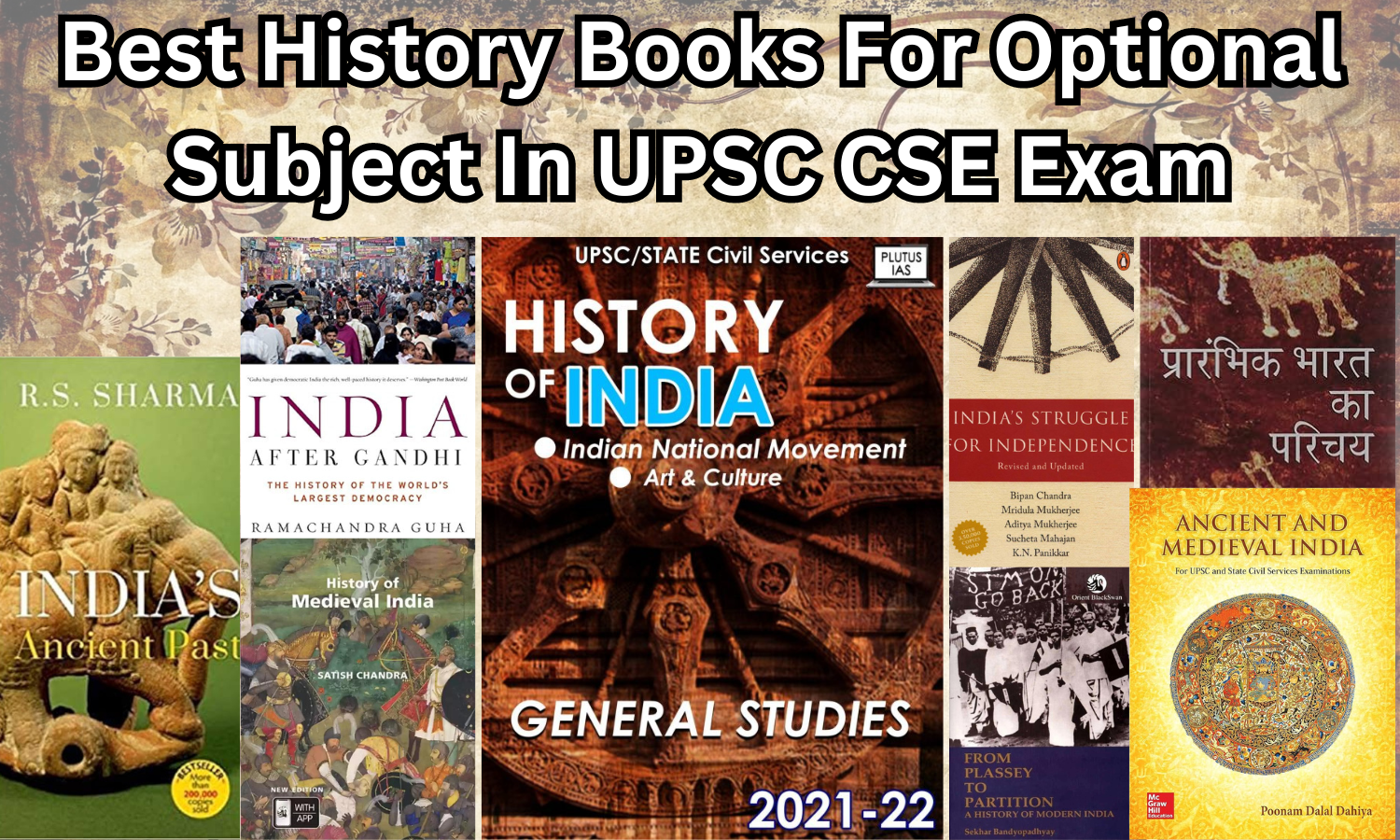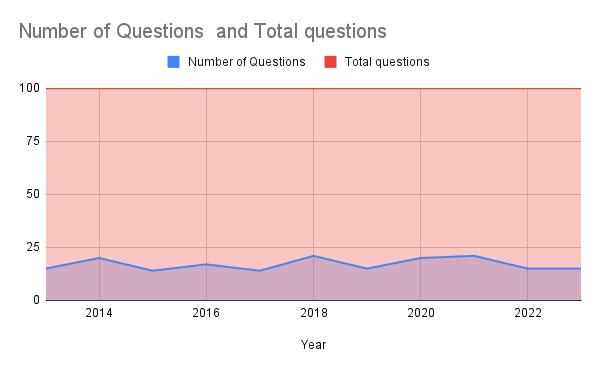
12 Oct The Best Books For History Optional In UPSC CSE Exam
Having the best UPSC History optional books is the first thing a candidate looks for after choosing History optional in UPSC exam. There are many reasons why a candidate chooses History optional in UPSC exam. The first being that History optional in UPSC is very much static, meaning, it does not move with time. The syllabus of History is well-defined, and if you have good knowledge of the type of questions and pattern of the UPSC, you can make a close guess of the questions that might come in the exam.
But guessing the exam questions is not enough if you are not equipped to answer those questions with relevant answers that can fetch you maximum marks. Only if you have the best books for history optional in UPSC exam will you be equipped to answer the questions with ease. In a total of 500 marks, you can expect 300+ marks provided you prepare meticulously and perform well in the exam.

The history optional can prove to be a very scoring subject if you know how to study the subject, prepare notes from best books for history optional in UPSC exam and be consistent and sincere in your exam preparation. History unlike othersubjects is static in nature, meaning the syllabus is strongly embedded. If you look at the PYQ papers and assess you will notice the following:
1. The syllabus of History optional is almost completed in your GS paper.
2. The only difference comes in the way you answer.
3. The topics from which questions are asked for GS and Optional paper are the same.
| General Studies | Optional Paper |
| 1. What were the events that led to the Suez Crisis in 1956? How did it deal a final blow to Britain’s self-image as a world power? (2014) | 1. Discuss the circumstances leading to the Suez Crisis of 1956 and examine its repercussions on global politics. (2014) |
| 2. Why did the Industrial Revolution first occur in England? Discuss the quality of life of the people there during the industrialization (2015) | 2. Explain why England became the harbinger of Industrial Revolution. Also throw light on its social consequences (2017) |
| 3. What problems are germane to the decolonization process in the Malay Peninsula? (2017) | 3. What happened to Malay after it was liberated from Japanese occupation in 1945? Discuss. (2022) |
| 4. “Latecomer” Industrial Revolution in Japan involved certain factors that were markedly different from what West had experienced. Analyse. (2013) | 4. “The process of industrialization in some other countries of Europe was different from that in England.” Critically examine. (2012) |
| 5. Discuss the role of women in the freedom struggle, especially during the Gandhian phase. (2016) | 5. What significant role did women play in the Indian National Movement? (2016) |
As you can see in the above table the questions that are asked in both the papers are from the same topic. Additionally, candidates also benefit from history as it helps them score marks in the Preliminary exam as well. In the graph below, you will see the number of questions that come from History and Art and Culture.
History Optional Preparation Strategy
- First and foremost is knowing the syllabus well. UPSC connects with the candidates through the syllabus. You can judge a journey of Optional subject just by assessing the syllabus.
- Right next after the syllabus comes books for history optional in UPSC. Having the right UPSC history optional books is very important. This is because it influences your notes which you prepare for the UPSC exam.
- Having the wrong upsc history optional books can cost you your chance to become an IAS officer.
- Read every chapter thoroughly. Each topic should be covered in the syllabus along with its subtopics. Completing each topic in detail can help you solve 99% of the problems in the UPSC exam. For example, in the UPSC exam with history optional, the candidate has to study about many rulers, but when it comes to History optional, questions about rulers only arise from Ashoka. If you prepare all subtopics within the main topic, you will be able to perform better in your exam.
- Familiarise yourself with UPSC History optional papers. This you can do by solving Previous Year Questions. The day you get comfortable answering all questions, you can be comfortable with the future exam.
- Along with this, you should also solve history optional test series. This will help you realise your shortcomings. With feedback from best IAS coaching institute in Delhi, i.e., Plutus IAS, you can guarantee better marks.
- Feedback from the best teacher of History optional, Dr. Jitendra Kumar, you will be better equipped to face the exam. Dr. Kumar specializes in History. He holds PhD degree from JNU and has many years of teaching experience to UPSC aspirants.
- You can also watch YouTube videos on history optional in UPSC exam.
Fundamental Books For History Optional In UPSC Exam
Get the best UPSC history optional books from reliable sources like – examophobia.com. You can also get UPSC history optional notes from OnlineKhanMarket.com. In this list you will find the best books for history optional for UPSC CSE exam.
NCERT Books
If you are starting your UPSC History optional paper, it is best to start with NCERT books. There is no better way to start your history optional in UPSC than with this book.
10 Years Perious Year Question Paper
This is the most important book in the list of UPSC history optional books.
Diksha Publication Topicwise Solved Paper
For additional help to know how to write answers in History optional paper, you can acquire this book.
Price: ₹474
Publisher: Disha Publication
India’s Ancient Past by R. S. Sharma
The list of best books for history optional in UPSC cannot be complete without reading this book.
Price: ₹135
Publisher: Oxford
History of Medieval India by Satish Chandra
To cover the Medieval India, this is one of the best UPSC history optional books you can find in the market.
Price: ₹228
Publisher: Orient BlackSwan
History of Modern India by Bipan Chandra
Modern history is one of the most important part of UPSC history optional. Majority of the questions come from this section. This book is one of the best UPSC history optional books in the market.
Price: ₹193
Publisher: Orient BlackSwan
From Plassey to Partition by Sekhar Bandyopadhyay
For GS and other optional courses, this book will give you additional knowledge. A lot of the readers find it a very interesting read.
Price: ₹387
Publisher: Orient Blackswan
India’s Struggle For Independence by Bipan Chandra
The language of this book is lucid and the best source for answer writing.
Price: ₹277
Publisher: Penguin India
If there is any book that gives a complete knowledge of the important parts in a single book, it is this. You can never go wrong with purchasing this book. It is the best choice for UPSC history optional books and all toppers study from this.
Plutus IAS History Optional Upsc Printed Notes
The notes are curated from the best teachers for History UPSC optional lectures. A lot of the toppers choose this notes book for having an edge to their answers.
Ancient & Medieval India by Poonam Dalal
You can purchase this book for additional knowledge.
Price: ₹587
Publisher: McGraw-Hill Education India
Modern Indian History by Sonali Bansal
For a higher understanding of topics, this book is a top choice.
Price: ₹585
Publisher: McGraw Hill
Ancient and Early Medieval India by Upinder Singh
You can also purchase this book for more diverse spectrum.
Price: ₹515
Publisher: Pearson Education India
The Wonder That Was India by A.L Basham
Reading this will show you a new curve in your answer writing. Certain chapters from the book can be used in your UPSC history optional exam preparation.
Price: ₹491
Publisher: Picador
India Since Independence by Bipan Chandra
This is a bible to anyone who wants to understand India. A lot of the questions are asked from this book.
Price: ₹450
Publisher: Penguin Random House India
India After Gandhi by Ramachandra Guha
This book also holds great importance in the UPSC history optional paper. Direct questions are asked from this book.
Price: ₹658
Publisher: Pan Macmillan India
Conclusion
Create history by taking history in the UPSC optional subject! There is no exaggeration in saying that the history subject is one of the most interesting subjects in the UPSC optional subject list. There is a very famous quote by E. H. Carr that says,” History is movement, and movement implies comparison. “ It is important to know the past, especially in the UPSC, in order to know and understand the present in depth.
When it comes to your UPSC history optional subject, remember that having the right books is just the beginning. To truly excel, it’s crucial to evaluate and enhance your preparation journey. Consider enrolling in a reliable UPSC coaching institute, such as Plutus IAS in Delhi, which can serve as your guiding light. With their support and resources, your chances of success increase significantly. Don’t leave it to chance; enroll in Plutus IAS today, the best UPSC coaching institute in Delhi.




No Comments